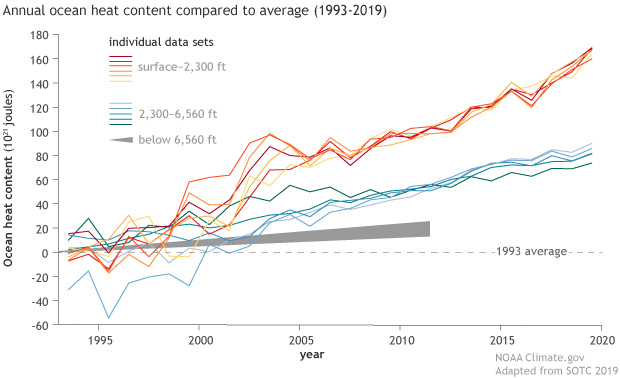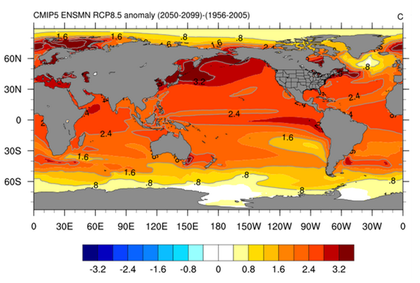Sea Temperature Rise
The ocean absorbs most of the excess heat from greenhouse gas emissions leading to rising ocean temperatures. Sea surface temperature has been consistently higher during the past three decades than at any other time since reliable observations began in 1880 see Figure 1.
This Summer S Sea Temperatures Were The Hottest On Record For Australia Here S Why
About two-thirds of global sea level rise is due to meltwater from glaciers and ice sheets the vast expanses of ice that cover Antarctica and Greenland.

Sea temperature rise. Consequently the projected sea-level rise in 100 years is about 25 lower than expected from the current simulations. The Ocean State Report reveals an overall trend globally of surface warming based on evidence from 1993 to 2018 with the largest rise in the. Sea surface temperature increased during the 20 th century and continues to rise.
Sea level is the average height of the ocean relative to the land between the high and low tides. The scientists said that limiting the temperature rise to 2C could potentially halve the area at risk and avoid a drastic rise in sea level. Rising temperatures cause coral bleaching and the loss of breeding grounds for marine fishes and mammals.
Sea Temperature Rise. Eyes on the Earth Track Earths vital signs from space and fly along with NASAs Earth-observing satellites in an interactive 3D visualization. Increasing ocean temperatures affect marine species and ecosystems.
One implication of climate change is sea level rise. Their new higher-resolution climate model simulation reveals a slower ocean temperature. Higher ocean temperatures around Antarctica increase the melting of these ice shelves resulting in an acceleration of land ice into the ocean and consequently leading to more sea-level rise.
But the uppermost skin of the sea down to about 250 feet is warming up the fastest heating up by an average of about 011 degrees Celsius each decade since the 1970s. Land ice and sea ice are not the same. Travel through Earths recent climate history and see how increasing carbon dioxide global temperature and sea ice have changed over time.
One of the most significant impacts of climate change is the warming not only of our atmosphere but also of our lands and waters. Scientists from Utrecht University using the national supercomputer at SURFsara in Amsterdam have found that the projected sea-level rise over the next century is about 25 lower than current models predict. Consequently the projected sea-level rise in 100 years is about 25 lower than expected from the current simulations.
Using a new higher-resolution climate model simulation scientists from Utrecht University found a much slower ocean temperature increase compared to current simulations with a coarser resolution. These results are published today in the journal Science Advances. Rising ocean temperatures also affect the benefits humans derive.
The average temperature of the North Sea rose by 167 degrees Celsius 3 degrees Fahrenheit over the past 45 years during which time the temperature of oceans such as the Pacific or Atlantic. From 1901 through 2015 temperature rose at an average rate of 013F per decade see Figure 1. Rising sea temperatures can threaten marine plants and animals by impeding migrations reproduction and other critical life.
The findings suggest that 4C warming could leave 34 of the area of all Antarctic ice shelves - around half a million square kilometres - at risk of collapse. The rising global temperature is causing both land ice and sea ice to melt. In Greenland most of the ice loss stems from warming air temperatures that melt the surface of the ice sheet as well as calving from the glaciers that empty into the sea.
Estimates for future sea-level rise are based on a large ensemble of climate model simulations. Recently though persistently higher temperatures caused by global warming have led to greater-than-average summer melting as well as diminished snowfall due to.
 Climate Change In The Pacific Northwest
Climate Change In The Pacific Northwest
 Arctic News Arctic Ocean Temperatures Keep Rising
Arctic News Arctic Ocean Temperatures Keep Rising
 Usgcrp Indicator Details Globalchange Gov
Usgcrp Indicator Details Globalchange Gov
Sea Temperature Global Greenhouse Warming
 Climate Change Indicators Sea Surface Temperature Climate Change Indicators In The United States Us Epa
Climate Change Indicators Sea Surface Temperature Climate Change Indicators In The United States Us Epa
 Sea Surface Temperature Wikipedia
Sea Surface Temperature Wikipedia
 Climate Change Indicators Sea Surface Temperature Climate Change Indicators In The United States Us Epa
Climate Change Indicators Sea Surface Temperature Climate Change Indicators In The United States Us Epa
 Sea Level Rise Rate Leads Global Temperature Climate Sanity
Sea Level Rise Rate Leads Global Temperature Climate Sanity
 The Temperature Of The Ocean Is Rising The Economist
The Temperature Of The Ocean Is Rising The Economist
 Climate Change Ocean Heat Content Noaa Climate Gov
Climate Change Ocean Heat Content Noaa Climate Gov




Comments
Post a Comment